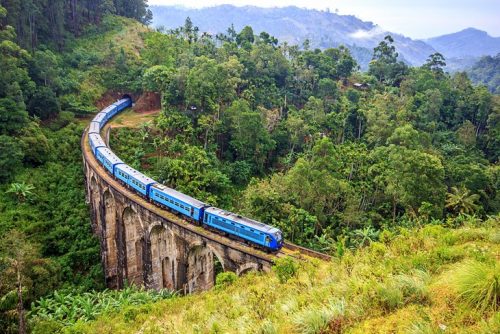Sri Lanka
Sri Lanka lies just off the coasts of South India, but the island nation is completely different from its neighbor. Weakened by a recent civil war and a deadly tsunami, Sri Lanka has never lost its mesmerizing appeal. The country may be small, but it displays an astonishing array of cultural and natural wonders. Majestic mountains, rolling plains covered with sublime tea plantations going as far as the eyes can see, perfect palm-fringed beaches, ancient ruins lost in the jungle, magnificent Buddhist temples, fascinating elephant parades… Anywhere you go, Sri Lanka is spectacular. And extremely easy to visit, as the distances are always short…
HEALTH INFORMATION
We make every effort to ensure that the information posted on our website is up to date and accurate according to the latest public health recommendations; however, it is impossible for us to make changes on a daily basis.
For the most current travel health recommendations, please call our clinic as make an appointment with one of our travel health professionals.
SRI LANKA – RECOMMENDED VACCINES
| The Yellow Fever Vaccine | A proof of vaccination against yellow fever may be required upon entry in to this country. Some travellers may not be eligible to receive this vaccine. Please enquire with your health care professional regarding your specific details. It is important to note that the vaccine should be administered at least 10 days prior to your departure. For further information, please consult with the World Health Organization (WHO) website: https://www.who.int/ith/ith- |
| Hepatitis A | Recommended for all travelers. |
| Hepatitis B | Recommended for all travelers. |
| Causes, Symptoms & Treatment – Typhoid fever | Recommended for all travelers. |
| Tetanus – Diphteria – Pertussis Vaccine | Tetanus: In exceptional circumstances (eg, stay in a region where access to health care is limited), for a person aged 18 years or older, 1 dose of DT may be given if 5 years or more has elapsed since the last dose. Otherwise, one booster dose at the age of 50*. Pertussis (Whooping Cough): 1 dose is recommended for pregnant women, for every pregnancy, regardless of immunization history and the interval since the last dose (betwen week 26 and 32). *Only applicable for Quebec. |
| Measles – Rubella – Mumps | Two doses recommended for all travelers born after 1970, if not previously given. |
| Cholera | For humanitarian workers and health care providers. |
| Flu – Influenza | Seasonal influenza occurs worldwide. The flu season usually runs from November to April in the northern hemisphere, between April and October in the southern hemisphere and year round in the tropics. Influenza (flu) is caused by a virus spread from person to person through coughing and sneezing or by touching infected surfaces. Everyone 6 months and older should get a flu vaccine yearly. Vaccine is recommended 14 days prior to departure. |
| Information, Advice & Vaccination – Japanese Encephalitis | Recommended for the following groups visiting certain remote areas:
|
| Routine vaccines (dCaT, Polio, Meningococcal, Shingles, Pneumococcal, Hepatitis B, HPV, MMR & Varicella) | Recommended for all travelers |
| Transmission, Symptoms and Prevention – Rabies | For travelers at high risk of animal bites or being involved in activities with bats, dogs and other mammals. Clients who plan to visit remote areas may consider receiving this vaccine. Important to note the pre-exposure rabies vaccine is administered in 2 doses with one week interval between doses. Post-exposure vaccination is always recommended, even for those previously vaccinated. |
| Turista – Traveler’s Diarrhea (ETEC) | Talk to your health care professional about the risks and precautionary measures to take, as well as the Dukoral® vaccine. Important to note that the Dukoral vaccine is an oral vaccine given in 2 doses, recommended at least 2 weeks prior to departure. |
| Dengue Fever, Chikungunya and/or Zika | There are many illnesses that are transmitted via mosquito bites and unfortunately we do not have vaccines to protect us against most of them. It is important to inquire with your healthcare professional regarding the specific risks and the different illnesses presently in circulation. |
RECOMMENDED MEDICATIONS
| Acetazolamide/Dexaméthasone | Recommended to prevent Acute mountain sickness (AMS). |
| Antibiotics Traveler’s Diarrhea | Azithromycin or Suprax |
MEDICAL CARE
In Sri Lanka, access to health care is good in Colombo. But outside of the capital city, medical care remains limited and of rather poor quality. If you require medical care while traveling in Sri Lanka, it is advised that you go to the National Hospital, the main hospital facility in the country. The Apollo Hospital and the Asiri Hospital can also be quoted. All these medical establishments are located in the capital city and provide good emergency trauma services. In the event of serious health issues, an air evacuation to another country is indispensable.
If you need an ambulance in Sri Lanka, call 422222.
Basic medicines are easily accessible in Sri Lanka. But specific pharmaceutical products are hard or impossible to find in the country. Pharmacists are not always well trained, so avoid asking them medical advice. It is safer to bring your own medical supplies when traveling to Sri Lanka, especially if you need very specific treatments.
SECURITY ABROAD
There is a threat of terrorism.
CANADIAN EMBASSY
Emergency services
In case of emergency, dial:
- police: 119 / 118
- tourist police: 94 (11) 242 1052
- medical assistance: 110
- firefighters: 94 (11) 242 2222

